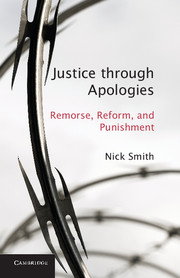Book contents
- Frontmatter
- Contents
- Acknowledgments
- Introduction
- 1 The Categorical Apology Revisited
- Part One The Penitent and the Penitentiary: Apologies in Criminal Law
- Part Two Apologies in Civil Law
- 4 The Institutional Framework: Economic Outcomes and Noneconomic Values
- 5 A Practical Framework for Evaluating Apologies in Civil Contexts
- Concluding Call for Collaboration
- Notes
- Index
Concluding Call for Collaboration
Published online by Cambridge University Press: 05 June 2014
- Frontmatter
- Contents
- Acknowledgments
- Introduction
- 1 The Categorical Apology Revisited
- Part One The Penitent and the Penitentiary: Apologies in Criminal Law
- Part Two Apologies in Civil Law
- 4 The Institutional Framework: Economic Outcomes and Noneconomic Values
- 5 A Practical Framework for Evaluating Apologies in Civil Contexts
- Concluding Call for Collaboration
- Notes
- Index
Summary
Niels Bohr defined an expert as someone “who has made all the mistakes which can be made in a very narrow field.” I have surely made many mistakes. Ten years ago, for example, it seemed like a good idea to think a single article could provide a comprehensive theory of apologies. Now that I have written two books on apologies, I am still hardly an expert on Bohr's account. Many, many mistakes remain to be made. We are only beginning to understand the complexity of apologies and remorse, and as we inch toward lucidity we discover how these concepts entwine with other equally intricate, contested, and rapidly evolving ideas. Consider, for instance, how neuroscience overwrites understandings of blameworthiness or emotions, or how “big data” revolutionizes how we predict crime and recidivism. Both of these increasingly quotidian bodies of knowledge will challenge current conceptions of apologies and their relation to law. Many of the suggestions in this book will eventually look like quaint folk knowledge, but hopefully some of the questions of the future will grow from the seeds planted here.
Those who expect the power of logical argumentation to finish the job of understanding apologies may reach this conclusion dissatisfied or even anxious. Apologies are highly context dependent creatures; their shape shifting defies static classification. As this book – along with I Was Wrong – struggles to apply a theory of categorical apologies to concrete cases, the cumulative effect should help readers develop the sort of phronesis that improves their judgments of the particularities of apologies as they find them in different legal habitats. Practical wisdom is an ongoing process of coalescing insight through practice, and it does not typically result from cribbing someone else's arguments.
- Type
- Chapter
- Information
- Justice through ApologiesRemorse, Reform, and Punishment, pp. 330 - 332Publisher: Cambridge University PressPrint publication year: 2014



